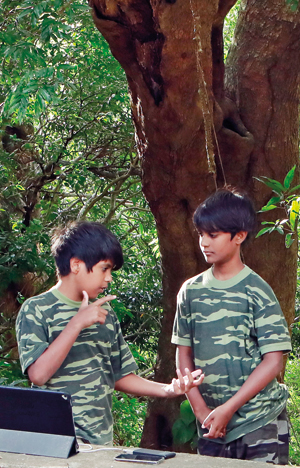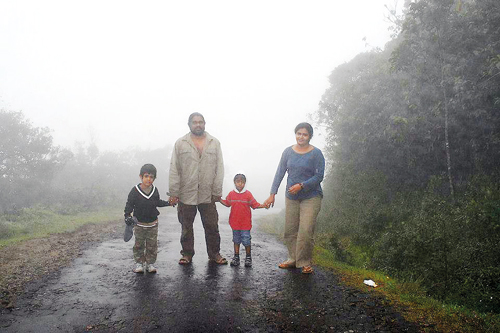The world is their school

Giving a virtual nature lesson: Amatha and Gagana in Knuckles this week
It’s a school day. Two boys, however, are not at desks restricted to a classroom, but roaming the mist-shrouded, rainforest-wreathed difficult terrain of the Knuckles Mountain Range with their father.
Seated in their home in Hendala, Wattala, on Wednesday, I am interviewing the mother, keeping a wary eye on a chameleon, in its green glory, slowly and surely making its way along the top of the settee towards me, while the boys’ three-year-old sister lisps that it is looking for kema (food) and as soon as it spies a fly, its long tongue would flick out!
Unconventional but powerful and hands-on education with the whole world around them, whether in the home or outside, as their classroom is what well-known conservationists and researchers L.J. Mendis Wickramasinghe and Nethu are imparting to their two sons 11-year-old Amatha and 10-year-old Gagana and daughter Aranga.
Aranga is weepy for she misses her brothers and keeps asking why she too cannot be with them. The home of the Mendis Wickramasinghes is very much alive, the walls having childish scribbles as well as paintings and in a verandah-corner the carpentry works of the boys.
Mendis and Nethu have their own non-governmental organization, the Herpetological Foundation of Sri Lanka (HFS), while being involved with many conservation initiatives and engaging in research to throw the spotlight on the hidden fauna of the country.
Conceding that going “solo” with the children is not easy and Menda (her term of endearment for her husband) is a very active participant in their growth and development, Nethu without losing her cool as mothers generally do, soothes Aranga and distracts her.
The whole family had been at Knuckles two weeks ago and just last week at the Horagolla National Park. “These days, Menda is at Knuckles with the boys on a research foray, so it was not possible for Aranga to tag along,” says Nethu.
Nethu and Menda had met at the Young Zoologists’ Association brought together by their passion for living beings, both wild and in the zoo.
Coming from a formal educational background, she has a Degree in Chemistry. It was inevitable that she would join the rat race of life, when she found Menda who had a Commerce background but was pursuing his love of nature and conservation as a self-taught scientist. She was then working as a teacher in an international school but felt inadequate, untrained and unprofessional, like so many thousands of others, in handling children.
She also remembers the wise words of her first Principal who told her in no uncertain terms that “just because you know a subject does not mean that you have the knowledge to teach it to others”.
Recalling the challenging times she had and how she was compelled to complain about a child dubbed a “gang leader” not only by other students but also teachers, Nethu says how this propelled her along with lots of regrets about the expulsion of that child, to get into education psychology.
When Nethu herself became a mother she wanted to do everything right by her children. The couple tried out a nursery for the two boys but realized that what they saw was not what was happening when the parents were not around. Then came the time when they had to send the boys to school and heard from many that there was no ideal situation in any school. They selected a school close by hoping to have strong bonds with it and helping to uplift its facilities and standards but were disappointed as “education as a means of a healthy experience” was not what Amatha and Gagana were acquiring.
“We didn’t want the boys to be pushed to memorize anything and regurgitate it,” says Nethu, explaining that their hopes and aspirations on the type of education they wished for their children were not fulfilled.
With trepidation but somewhat of a compulsion, Nethu and Menda decided on home-schooling.
Quoting Jean Piaget (a Swiss psychologist known for his work on child development), Nethu says they too based their approach on “the more a child has seen and heard, the more he wants to see and hear” and decided on a non-formal pedagogical alternative educational approach which builds on a child’s inherent curiosity.
The goal is to nurture an adult with an identity, meaning and purpose in life.
Nethu armed herself with a Post-Graduate Diploma in Education to better handle this important task by becoming an educator herself.
…….And so, they let loose Amatha and Gagana with ample opportunities to explore, interact, play and learn “purposefully” in different settings including natural habitats, zoos and botanical gardens.

Out in the wilds from a young age: Amatha and Gagana at Horton Plains with their parents Mendis and Nethu
“We gently guide these explorations, giving an opportunity for discovery-based play and learning. We facilitated the process of learning to ensure safety, while guiding and providing the information needed at all times, both indoors and outdoors,” says Nethu.
Moving away from the formal education system which has as its base, competitive examinations, Nethu and Menda are using holistic, non-formal, child-centred, nature-based, multiple intelligence home-schooling. The teaching methods are discovery-based, activity-based and inquiry-based learning along with co-operative learning, demonstrations and discussions.
Nethu says that assessments are through Bloom’s taxonomy and the natural instinct to scaffold to the next level once the child is ready, based on Vygotsky’s Theories. (These theories underscore the fundamental role of social interaction in the development of cognition which includes the construction of thought processes such as remembering, problem solving and decision-making)
As these young naturalists, explorers, excellent swimmers, great speakers, musicians and talented snake-handlers address a large audience via Zoom today on ‘Recognizing deadly venomous snakes from harmless snakes in Sri Lanka’, organized by the Youth Wing of the Wildlife and Nature Protection Society (WNPS), it is obvious that rather than being worse for wear due to home-schooling, Amatha and Gagana are well-rounded personalities.


